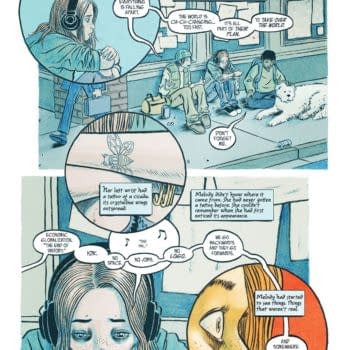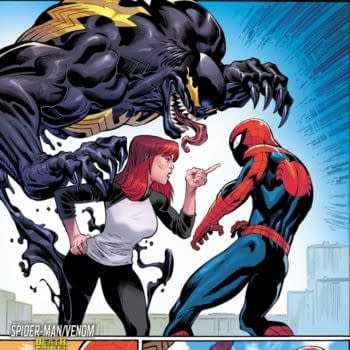Posted in: Comics | Tagged: Comics, Comics Are For Everyone, entertainment, Johnny Parker II, Karenina Sherif, sdcc
The Comics Industry Has An Accessibility Problem
Alex Roberts writes: One of the San Diego Comic Con panels, titled "Comics are for Everyone… Aren't They?" delved into the issue of accessibility at the convention and in the larger comics industry. Assembled by Rosie Knight of Nerdist, the panel also featured Jazmine Joyner (Visionary Comics), John Jennings (Kindred), Regine L. Sawyer (Women in Comics), Rachelle Cruz (UC Riverside), Adam Karenina Sherif (Orbital Comics), and Johnny Parker II (Broken).
Rosie Knight started with defining the panel as an exploration into accessibility, intersectionality, and representation.
"When we talk about accessibility, we're really at the base level talking about physical access to spaces," Knight said.
We were immediately given an example as even the room for the accessibility panel was not accessible. There were no ramps to the stage and the staff did not know how to properly use the lift, resulting in an earlier issue with trying to use it. As the panel discussed, it is important to allow fans to enjoy Conventions without needing to worry about where they can and cannot go.
"For me, the question is 'Am I allowed to be here?'" Cruz stated, in regard to both physical accessibility and intersectionality.
"I would suggest we are all poorer for a lack of accessibility," Sherif pointed out.
"Every fandom, everything in the world, needs to be accessible to anyone and anybody," Sawyer told the room, "Accessibility is a #1 right for anyone who needs it."
The panel took place on Saturday, so it was only natural to discuss the Eisner Awards from the night before. Many of the panelists were in attendance or nominated and found it a very inaccessible venue. They pointed out that most of the queer and black nominees were seated at the back two tables, furthest from the action.
Additional discussion on the Eisner's brought up that, while more and more diverse names are being brought into the nomination pool, it doesn't necessarily result in more diverse winners. Time and time again, the people being handed Eisner's are white males.
"The Eisner's diversified the nomination pool, but none of them won," Knight said. "Come in, but don't actually come in."
Sherif had past experience with being on the judging panel for the Eisner's and was stunned by how inaccessible many of the comic stores being nominated were. It was not uncommon to find comic stores boast two floors, but not having a lift to allow disabled customers to reach the second floor.
Comic stores were also a long topic of conversation. Panelists and audience members alike shard their struggles with being able to get to comic stores, with many not having a comic store within a half hour or hour distance. For some who grew up in a poorer family, this meant they could not get comics at all without it being a special occasion.
Joyner spoke about how the industry essentially forces comic shops to carry mainly the Big Two (DC and Marvel) and making it very hard to carry unique and lesser-known comics. Joyner chooses to create accessibility by seeking out diverse and more obscure comics so that anyone who enters her store can find something to relate to.
While discussing representation, Jennings used the term "symbolic annihilation," relating to how the underrepresentation of people can lead to erasing their existence. Knight followed up on this notion later, proposing that in the distant future, comics could be looked back on as a historic value, a representation of our culture and folklore. If comics are not representative of a diverse culture, we are effectively erasing marginalized voices from our history.
During a discussion on how creators need to be more aware of what they are putting into their work and what it represents, Parker brought up that editors also need to be held accountable. Joking about ruining his future career chances, Parker said that editors are the behind-the-scenes people who can make a difference that often get overlooked in these discussions.
Ultimately, the panel pointed to needing greater education and more discussions to solve these issues.
"What is radical should be our norm," Sherif said about pushing for greater diversity and accessibility.
"The radical space starts with changing one's worldview," Cruz later said.
Toward the end of the panel, Knight urged people to continue to push others and themselves, "It's very hard for people to unlearn privilege."
Follow the panelists on Twitter to learn more about their individual works to improve accessibility and representation.
















